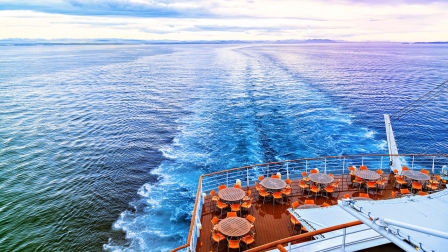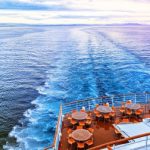Set Sail As A High-Seas Solopreneur
Righteously vowing to leave the country is now an established custom in election-year America. This year, some of that repining has taken on a more serious tone than usual. Whatever your own political hopes, expectations, or sweat-drenched nightmares, it’s worth remembering that plenty of Americans live and work abroad already, for loads of reasons.
Most expat entrepreneurs settle down in a foreign city, while others take a nomadic approach, building their businesses from the road; still others leave behind the urban rat race to live and work from a beachside paradise. Those all come with their own challenges.
It’s another thing entirely to board a boat and hit the open ocean, living a landless existence while still earning a living. But if you’re really looking to get away from it all, becoming a full-time, seafaring knowledge worker isn’t as outlandish as you might think. Here’s why—and what it’ll take to keep yourself afloat.
Why Ship Out?
Mario Salcedo has been living and working aboard cruise ships for the past 20 years, but not as a paid crew member. He works for himself as an independent financial consultant, hopping from one ship to the next and taking his business with him.
When Salcedo embarked on this lifestyle in 1996, he says his objective was twofold: “Transition to self-employment, and at the same time begin to undertake my lifelong dream of traveling all over the world.” So at 47, he gathered the contacts he’d made and went into business for himself. He started by taking a few trial cruises to see whether he liked being shipbound and could still work productively that way. Soon enough, he got into the swing of things, settling on Royal Caribbean as his cruise line of choice.
Today Salcedo is a familiar face to crew members who often tape a sign to his workspace that says “Super Mario’s Office.” Explaining his routine to Condé Nast Traveler earlier this year, Salcedo says he plans ahead to control living expenses and keep things consistent. He books interior staterooms (they’re cheaper than outside-facing cabins) two years in advance, allowing him to stay aboard the same ship for multiple voyages. He uses Royal Caribbean’s loyalty program to pay a lower surcharge for single-occupancy rooms. Salcedo also keeps a condo in South Florida, but he touches dry land only around 15–20 days a year.

For Salcedo, as for many “solopreneurs,” the choice to become his own boss and live outside the U.S. was lifestyle-driven. “I continue to practice my profession but mix it with lots of free quality time,” he tells Fast Company, “sort of like a permanent working vacation.”
Jeanna Barrett, who left a 12-year career in San Francisco in order to work as an independent marketing strategist in Belize, likewise says that one of the biggest perks—and, initially, sources of anxiety—was how much less she needed to work in order to support herself. “When your costs of living come down dramatically,” she writes for Fast Company, “it’s easy to keep your daily workload pretty short and still earn enough income to support yourself comfortably.”
Salcedo has trimmed his client base to just 10 high-value clients and works no more than five hours a day, from a small table he sets up on the pool deck. Barrett works from the beach and goes swimming at lunchtime.
Letting cruise ships tote you around the world isn’t the same as captaining your own vessel, of course, and it goes without saying that you should know how to sail if you prefer a more solo experience. But if you’re sold on the benefits and nautically qualified to take advantage of them, these are some of the practical steps you’ll need to take next.
Pick A Flag, File The Paperwork, And Hang Onto Your Passport
For some people, the appeal of living at sea is political. “Seasteaders” like Peter Thiel, Donald Trump’s highest-profile backer in Silicon Valley, propose building offshore, libertarian utopias free from the reach of government. For others, the reasons are more pragmatic. “I had a client once who was hiding out from the PLO [Palestinian Liberation Organization] because he had been threatened with assassination,” says John Kimball, chair of Blank Rome LLP’s maritime practice group. He also mentions the illegal commodities trader Marc Rich, later pardoned by President Bill Clinton, and the securities fraudster Robert Vesco, who some say faked his own death in Havana in 2007 and escaped to Sierra Leone—both of whom dodged prosecution in part by sailing in international waters.
If you aren’t trying to make a political point, escape violence, or evade arrest, there are still a few decisions to make. First, says Kimball, you probably shouldn’t renounce your citizenship—a notion that sometimes occurs to people who are keen on shirking dry land for good. That’ll make pretty much all ports, medical help, political asylum, and fresh milk for your floating fridge a lot harder to gain access to.
Second, you’ll need to pick a flag to sail under. Like being a stateless person, stateless ships create “all sorts of international-law problems,” Kimball explains. However, plenty of vessels fly “flags of convenience,” where you can have a state that’s at least recognized, but imposes very minimal obligations for taxes and safety requirements, he explains. According to Kimball, the Republic of the Marshall Islands, Panama, Liberia, and Nigeria are popular options for those reasons. But he’s quick to caution that none “could ever really come to your aid if you were in trouble because they don’t have the resources.”
In the U.S., the Coast Guard is in charge of vessel documentation, which Kimball says is pretty straightforward (although third-party companies like this one can help you navigate it for a fee). The cost of registering your boat starts at just $133 for the initial certification, but expenses can mount considerably from there depending on the vessel’s size and the type of activity it’s used for.
Finally, like Salcedo, you may not want to sell or stop renting property on land since you’ll need a bank account in order to run your business, and that usually requires a permanent address. Then again, adds Kimball, “I do know people who have lived on boats in the Hudson River, for example.” Otherwise, he says, since the U.S. charges income tax on expats regardless of their location, being your own boss at sea isn’t much different than reporting to one in Vancouver.
Get Connected—And Used To Some Digital Hiccups
According to U.S. Navy Commander (Ret.) and Pace University professor Andrew Coggins, staying connected on the open ocean is easier, thanks to the airline and cruise industries. Over the past 10–15 years, they’ve successfully lobbied the government to open up more satellite bandwidth to the commercial sector in order to offer passengers phone connectivity and Wi-Fi.
Telecom companies that provide maritime services like Inmarsat, ViaSat, and others, sell data and voice packages for leisure craft and commercial vessels. Just as you do at home, that requires installing hardware provided by the carrier, then paying for a data plan, either at a metered rate or in flat installments.
Outside the U.S., Internet connections are generally less reliable—Barrett notes that there are some periods in Belize when her Internet just flakes out for a while—so you should probably be prepared for that to happen at sea, too. On cruise ships, the blog CruiseCritic points outs, connections still don’t quite match those on land, so “there will always be some level of unreliability, especially the farther out to sea you sail.”
And while the positions of the satellites that your onboard tech communicates with can make a big difference, Coggins adds that you’re more likely to be within range if you chart a course within the sea lanes where most commercial vessels sail. CruiseCritic notes that the higher concentration of low-orbiting satellites over the Caribbean, meant to service cruise-goers, can make signals stronger there.
But Salcedo says the strength of your Internet connection may not be your biggest worry: “Health is number one.” Even on a fully staffed cruise ship, the onboard medical facility can’t cope with major health issues. If you’re fending for yourself or sailing with just a small crew, the risks of a health crisis you can’t attend to go way up.
Otherwise, says, Salcedo, “you have to have an extreme passion, addiction, obsession to be sailing on the ocean, with your living space smaller than what you would find on land. For the rest of your life.”
Fast Company , Read Full Story
(29)





